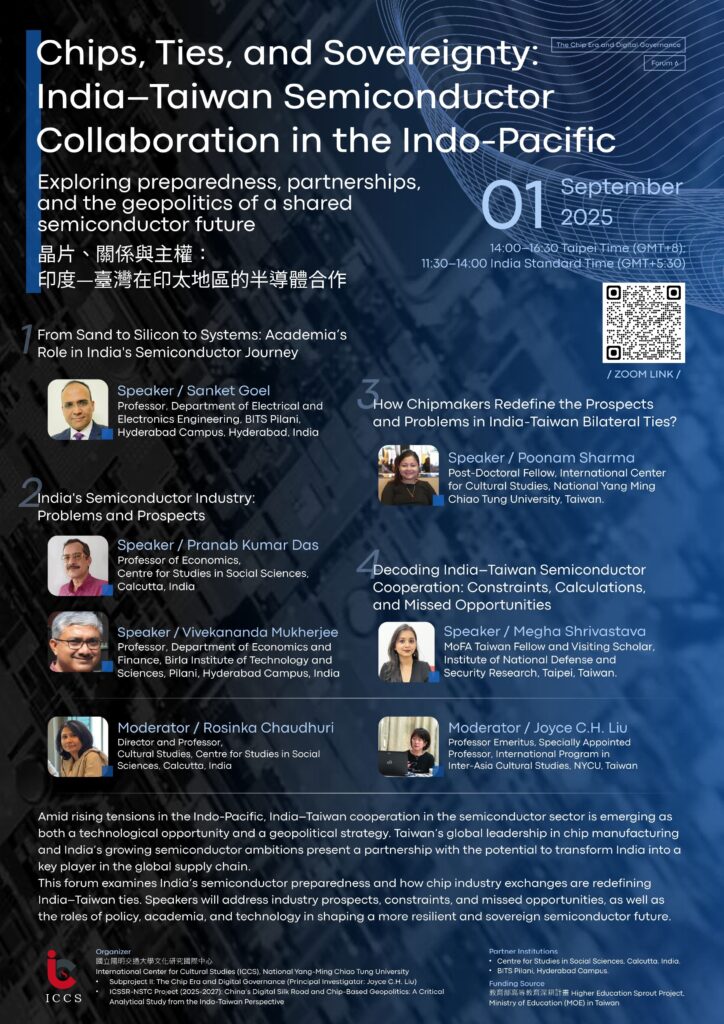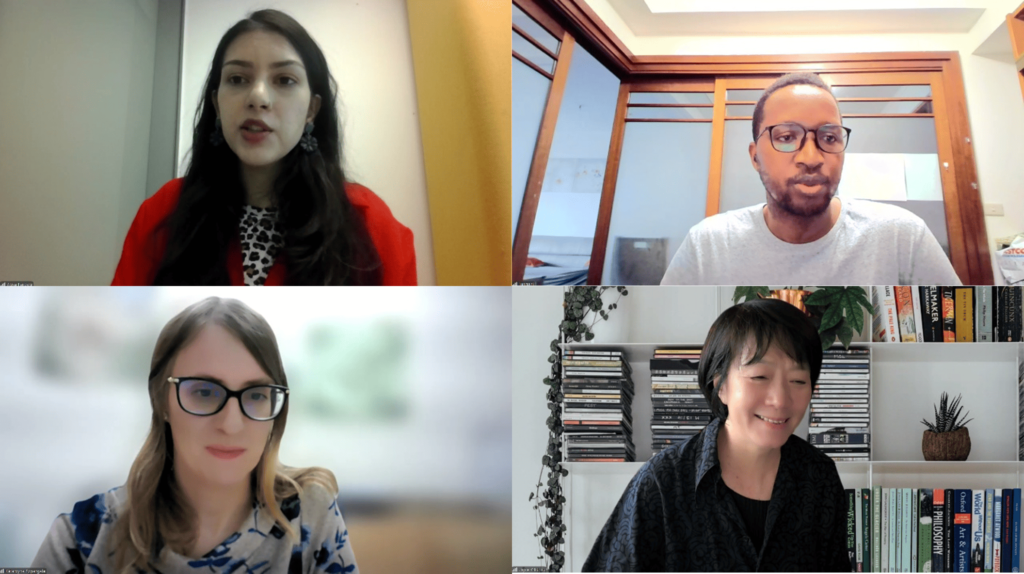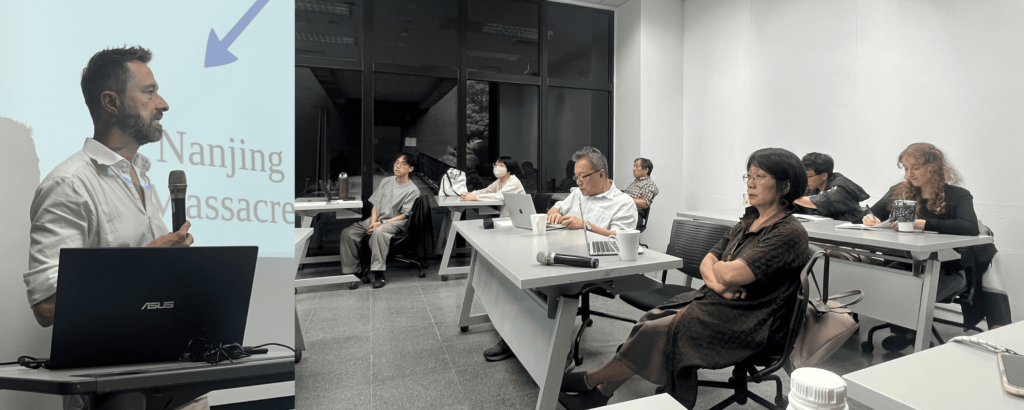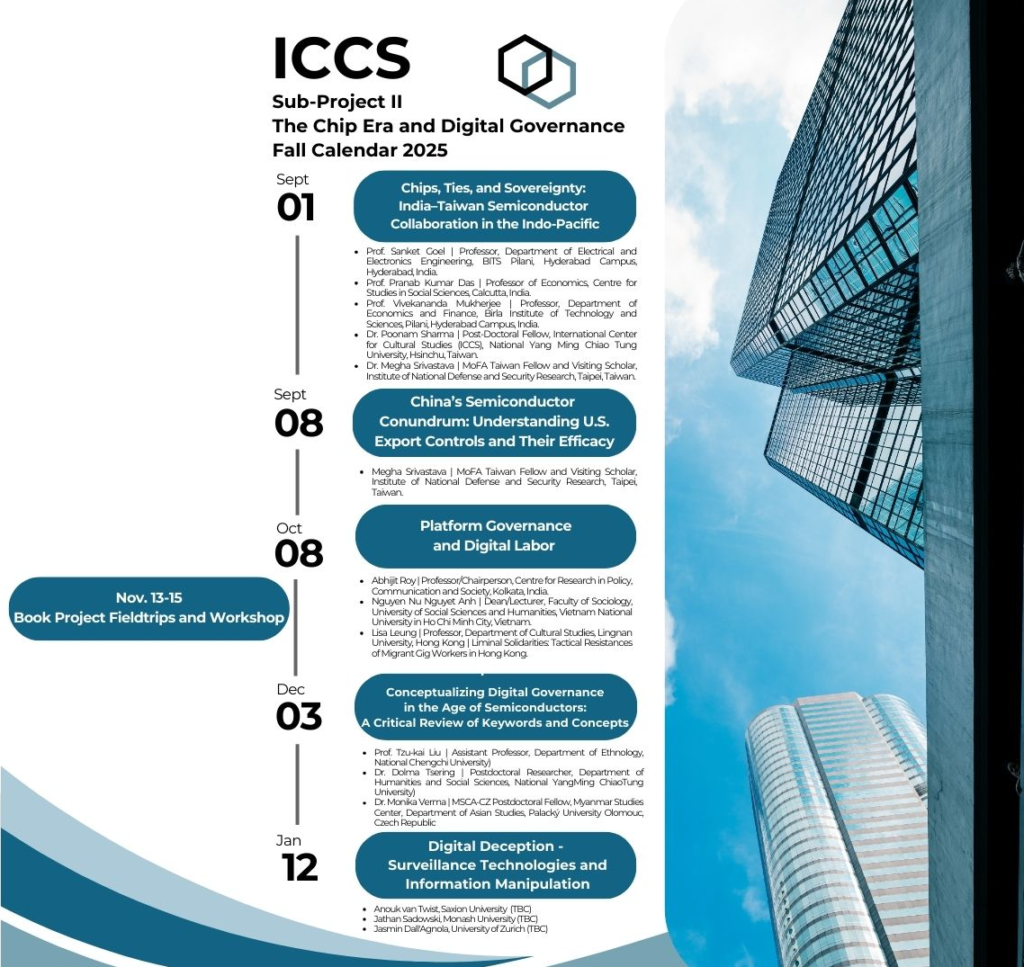
September | Chips, Ties, and Sovereignty: India–Taiwan Semiconductor Collaboration in the Indo-Pacific
🌏晶片、關係與主權:印度—臺灣在印太地區的半導體合作
Exploring preparedness, partnerships, and the geopolitics of a shared semiconductor future
📌Date and Time: September 1, 2025, 14:00–16:30 Taipei Time (GMT+8)
📌Format: Online
📌Zoom Link: https://us02web.zoom.us/j/83135486722?pwd=rPumBKRJD5hin5i1dnay09bylKN0Dm.1
📌Forum Language: English
Synopsis
Amid rising tensions in the Indo-Pacific, India–Taiwan cooperation in the semiconductor sector is emerging as both a technological opportunity and a geopolitical strategy. Taiwan’s global leadership in chip manufacturing and India’s growing semiconductor ambitions present a partnership with the potential to transform India into a key player in the global supply chain.
This forum examines India’s semiconductor preparedness and how chip industry exchanges are redefining India–Taiwan ties. Speakers will address industry prospects, constraints, and missed opportunities, as well as the roles of policy, academia, and technology in shaping a more resilient and sovereign semiconductor future.
From Sand to Silicon to Systems: Academia’s Role in India’s Semiconductor Journey
💭Sanket Goel
Professor, Department of Electrical and Electronics Engineering, BITS Pilani, Hyderabad Campus, Hyderabad, India.
Prof. Sanket Goel is a Professor of Electrical and Electronics Engineering at BITS Pilani, Hyderabad Campus, and headed the department from 2017 to 2020. He holds degrees in Physics from the University of Delhi and IIT Delhi, and a PhD from the University of Alberta, Canada.
India’s Semiconductor Industry: Problems and Prospects
💭Pranab Kumar Das
Professor of Economics, Centre for Studies in Social Sciences, Calcutta, India.
Prof. Pranab Kumar Das, economist at CSSSC since 1992, specializes in banking, finance, and macroeconomic models, has taught globally, published widely in top journals, authored and edited books, and served as World Bank Country Expert on India’s fiscal modeling.
💭Vivekananda Mukherjee
Professor, Department of Economics and Finance, Birla Institute of Technology and Sciences, Pilnani, Hyderabad Campus, India.
Prof. Vivekananda Mukherjee of BITS Pilani, with a PhD from Jadavpur University, is an applied and public economics scholar, postdoctoral fellow in France and Belgium, visiting scholar globally, and author of 60+ publications, serving on two international journal editorial boards.
How Chipmakers Redefine the Prospects and Problems in India-Taiwan Bilateral Ties?
💭Poonam Sharma
Post-Doctoral Fellow, International Center for Cultural Studies (ICCS), National Yang Ming Chiao Tung University, Hsinchu, Taiwan.
Dr. Poonam Sharma is a Post-Doctoral Fellow at the International Center for Cultural Studies (ICCS), National Yang Ming Chiao Tung University, Hsinchu.
Decoding India–Taiwan Semiconductor Cooperation: Constraints, Calculations, and Missed Opportunities
💭Megha Srivastava
PhD Student, Department of Geopolitics and International Relations (DGIR), Manipal Institute of Social Sciences, Humanities and Arts (MISHA), Manipal Academy of Higher Education (Institute of Eminence), India.
Megha Srivastava is a MoFA Taiwan Fellow and Visiting Scholar at the Institute of National Defense and Security Research, Taipei, Taiwan.
📌Organizer
國立陽明交通大學文化研究國際中心 International Center for Cultural Studies (ICCS), National Yang-Ming Chiao Tung University
- Subproject II: The Chip Era and Digital Governance (Principal Investigator: Joyce C.H. Liu)
- ICSSR-NSTC Project (2025-2027): China’s Digital Silk Road and Chip-Based Geopolitics: A Critical Analytical Study from the Indo-Taiwan Perspective
📌Partner Institutions
Centre for Studies in Social Sciences, Calcutta, India.
BITS Pilani, Hyderabad Campus.
📌Funding Source
教育部高等教育深耕計畫 Higher Education Sprout Project, Ministry of Education (MOE) in Taiwan
Event Report
The forum began with meeting and greeting everyone. Prof. Joyce Liu and Dr. Poonam Sharma started by outlining the schedule of the forum. The presentations from various speakers, each allocated 20 minutes, were followed by a roundtable discussion among the speakers and a Q&A session with the audience. Prof. Liu also welcomed Prof. Rosinka Chaudhury, who co-moderated the event along with Prof. Joyce. The order of speakers was clarified, and the need for brief introductions was emphasized. The organizing group discussed the technical details, such as screen sharing and timing, and suggested contacting absent participants. (Read More)






